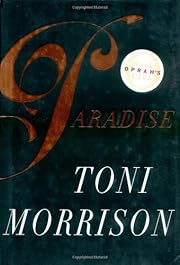

Click on a thumbnail to go to Google Books.
|
Loading... Paradise (1997)by Toni Morrison

There was no catharsis at the end of this book, but there was not any unquenchable tension either. It's so layered, maybe too layered. Beautiful wording though. Very character driven and internally progressed. Interesting, but it made me impatient. Didn't quite understanding the meaning of the ending, but I feel that was Morrison's goal for the whole book. Lots of unknowns from beginning to end. I'm not giving this book any stars because, to be honest, I don't really understand what I just read! There were moments of beauty in this book -- pearls of exquisite writing -- but I just could not follow the story line let alone make sense of the greater meaning. I'll be discussing this with some friends who I hope can enlighten me! Like the first two book in the Beloved trilogy, Beloved and Jazz, the overarching themes of Paradise are coping with loss and pain; powerful, toxic memories; loss of innocence; and a more nuanced examination of female empowerment in the context of the legacy of slavery. The more granular themes in this third novel are hatred, love, and a kind of NIMBY sensibility. Unfortunately, I liked this book the least of the three and was disappointed that the almost magical lyricism of the first novel and, to a lesser extent, the second novel, was absent in this one despite the oft pretty prose. The story focuses on fifteen families over five generations in an all-Black Oklahoma town, Ruby, which actively excludes outsiders. It begins when armed men from Ruby search a convent some miles out of town for five women who they believe are immoral and pose a threat to the harmony in Ruby. The story that follows focuses on explaining who those men are and why their intended victims were brought to the convent in the first instance. The chapters are named after different women, and told through various narrators, some more reliable than others. in reality, the women are a scapegoat for Ruby’s own intergenerational conflict. I did like Morrison’s character development, but I found in this novel there was more telling than showing, unlike the first novel. The themes Morrison wove like magic threads into a sturdy tapestry with seamless subtlety in Beloved seemed to have devolved into an explicit bludgeon. I even examined my reaction for, perhaps, some visceral reaction to the citizens of this all-Black town becoming oppressors, and I do not believe it was that. It is just that I recently read Beloved and Jazz, and this one did not measure up, to my great disappointment. “Paradise is defined by those who can’t get in.” - Toni Morrison I have felt with all Toni Morrison’s books, that I would really benefit from re-reading them. In the case of Paradise, I feel a re-reading is essential. I think this is a very sophisticated novel, and if I am able to draw more satisfying conclusions on a second read, than I will have learned a lot, but at this moment I am a frustrated reader who was just bested by a book. The only thing I know for sure right now is that Paradise as a concept, is a paradox. Belongs to SeriesBeloved Trilogy (3) Belongs to Publisher SeriesKeltainen kirjasto (312) Keltainen pokkari (22) A tot vent (365) AwardsDistinctionsNotable Lists
Fiction.
African American Fiction.
Literature.
Historical Fiction.
HTML: In prose that soars with the rhythms, grandeur, and tragic arc of an epic poem, Toni Morrison challenges our most fiercely held beliefs as she weaves folklore and history, memory and myth into an unforgettable meditation on race, religion, gender, and a far-off past that is ever present. No library descriptions found. |
Current DiscussionsNonePopular covers
 Google Books — Loading... Google Books — Loading...GenresMelvil Decimal System (DDC)813.54Literature American literature in English American fiction in English 1900-1999 1945-1999LC ClassificationRatingAverage: (3.77) (3.77)
Is this you?Become a LibraryThing Author. |
||||||||||||||||||||||||||||||||||||||||||||||||||||||||||||||||||||||||||||||||||||||||||||||||||||||||||||||||||||||||||||||||||
In the town of Ruby there have been no deaths. No murders, no rape, no excess violence. A town formed from dream; a continuation of a legacy and vision of the descendants of the founders of Haven. Haven was a town established by Black people recently emancipated, having been rejected for their race, dark skin colour, and class, through hard work and sacrifice. Therefore the people of Ruby, just like any society, have their origin story; a set of rules to administer it; and, naturally, their internal conflicts. But being the patriarchal society it is, the set of rules is administered by the male leaders of the town, and just like in all patriarchal societies, these rules are meant–among other things–to control women's bodies, and their sexualities as well.
So when a group of traumatized women seek refuge in the outskirts of the town, in what was a former school for Indian girls ran by nuns, their free lives, uncontrolled and unsupervised by men, draws the attention of the town. They become
both scapegoat and threat for and to the male leaders of Ruby, and eventually violence erupts.
This book was so good, so vast, and so difficult. The complexity of its structure; the many full formed characters that are hard to keep up with; the different ancestry lines explored; this book required effort. It took about halfway through the book for all that had been set to unspool itself, but I had complete trust in Toni Morrison and I can say that the trust and effort were certainly more than rewarded. This book felt similar to [b:Song of Solomon|11334|Song of Solomon|Toni Morrison|https://i.gr-assets.com/images/S/compressed.photo.goodreads.com/books/1632283992l/11334._SY75_.jpg|3215642] in its language and how myth, the "unnatural", and the mysterious blend so richly into the narrative of the story. (